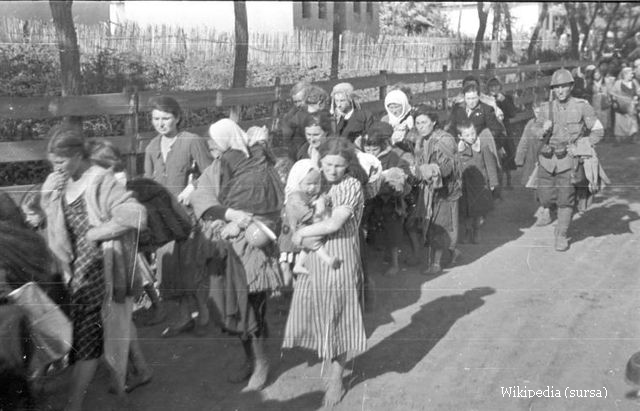Deportation of Jews in Romania
On October 9, 1941, the deportation of Jews in Romania started with the province of Bukovina.

România Internațional, 17.10.2016, 13:34
75 years ago, on 9 October 1941, the deportation of Jews in Romania
started with the province of Bukovina. Overall, 140,000 Jews died in
concentration camps in Transdnestr. 130,000 more Jews in Northern Transylvania,
a Romanian territory ceded to Hungary in 1940, had the same fate. Persecution
of the Jewish population was nothing new, it had started with the Goga-Cuza
government, in power between 29 December 1937 and 10 February 1938, which
passed a race law. On 21 January 1938, Government Decree 169 revised the legal
description of Romanian citizenship, and, as a result, 225,222 people, making
up 36.5% of Romanian Jews, lost theirs. The persecution of the Jews continued
under the pro-German government led by Ion Gigurtu in the summer of 1940. On
August 8 1940, at Prime Minister Gigurtu’s proposal, King Carol II signed the
decree on the legal status of Romanian Jews. The decree legalized inequality
under the law, adding taxes or the obligation to perform community service, in
addition to the interdiction to acquire property or hold public office, as well
as segregating education and making it impossible to bear a Romanian name. A
second decree banned mixed marriages, providing a penalty of 2 to 5 years
imprisonment.
On August 23 1939, Nazi Germany and the Soviet Union signed the
Molotov- Ribbentrop pact, dividing Eastern Europe among themselves. As a
result, the Soviet Union sent Romania two ultimatums, on June 26 and 27,
demanding it cede Bessarabia and Northern Bukovina within two days. While the
Romanian armed forces and administration left, making room for Soviet
officials, a part of the Jewish population in the area booed and attacked the
Romanian troops and cheered the Soviet army, which only led to further
persecution. After Romania took control once again over those territories in
the summer of 1941, anti-Semitic policies worsened, leading to the ordeal of
Romanian Jews, which started on 9 October 1941.
Historian Andrei Oisteanu spoke
to us about the reason why October 9 is
the day on which we commemorate the Holocaust in Romania:
The Romanian Parliament voted to institute October 9 as the day when we
commemorate the Holocaust in Romania. It is a very important day, not only for
Jews, but for all the citizens of this country. I myself sat on the board that
decided on the date when we commemorate the Romanian chapter of the Holocaust.
We did not want to have this day in January, when the international day
commemorating the Holocaust is. The reason is that in Romania, Holocaust denial
is not against the European Holocaust, but against the one in Romania.
Therefore we chose October 9th, a day that has historical
significance. I quote here a part of the order issued by the prefect of
Bukovina, who decreed that on October 9 deportation would commence for Jews in
Bukovina, then Bessarabia, sending them to camps in Transdnestr. It reads as
follows: Today, October 9th, 1941, the Jewish population of the
villages of Itcani and Burdujeni, as well as that of the city of Suceava, shall
leave by train.
Leaving for Transdnestr was a death sentence. However, death
trains had started as early as June 1941, when the military and civilian
authorities organized a pogrom in Iasi, leaving 13,000 Jews dead. As witnessed
by plaques in railway stations and synagogues in the towns of Radauti, Vatra
Dornei, Campulung Moldovenesc, Gura Humorului and Suceava, in the autumn of
1941, 91,845 Jews were deported from Bukovina by order of Ion Antonescu. During
that time, the mayor of Chernauti, Traian Popovici, managed to save 19,000 Jews
from deportation.
Here is historian Andrei Oisteanu, talking about the
beginnings of the genocide 75 years ago:
They were sent off from the railway station in Burdujeni
in freight cars. Of the ones who went away on foot, the slower ones were simply
shot and left on the side of the road. For this reason, Goebbels wrote in his
diary that Romanians couldn’t even organize a proper genocide, since they left
corpses on the side of the road to spread disease. Of course, the Jews were
robbed of their possessions, and got their houses taken away, along with their
money and jewelry. The same decree stated that concealing property from
confiscation was punishable by death. In the end, the Jews who did not die on the
road to the camps were not gassed, but many were either shot, or died of hunger
and disease.
The Jews of Bessarabia suffered similar persecutions. In October
1941, ghettos and labor camps were set up in over 150 places. Between October
1941 and August 1942, 150,000 Jews were sent here from northern Romania, and
only 50,000 survived the ordeal. They were used as forced labor, mostly for
building roads. 22% of the deportees were children, and 20,000 of them died of
starvation, disease and exposure. October 9 1941 was the beginning of the end
for the over 700,000 Jews in Greater Romania.






























